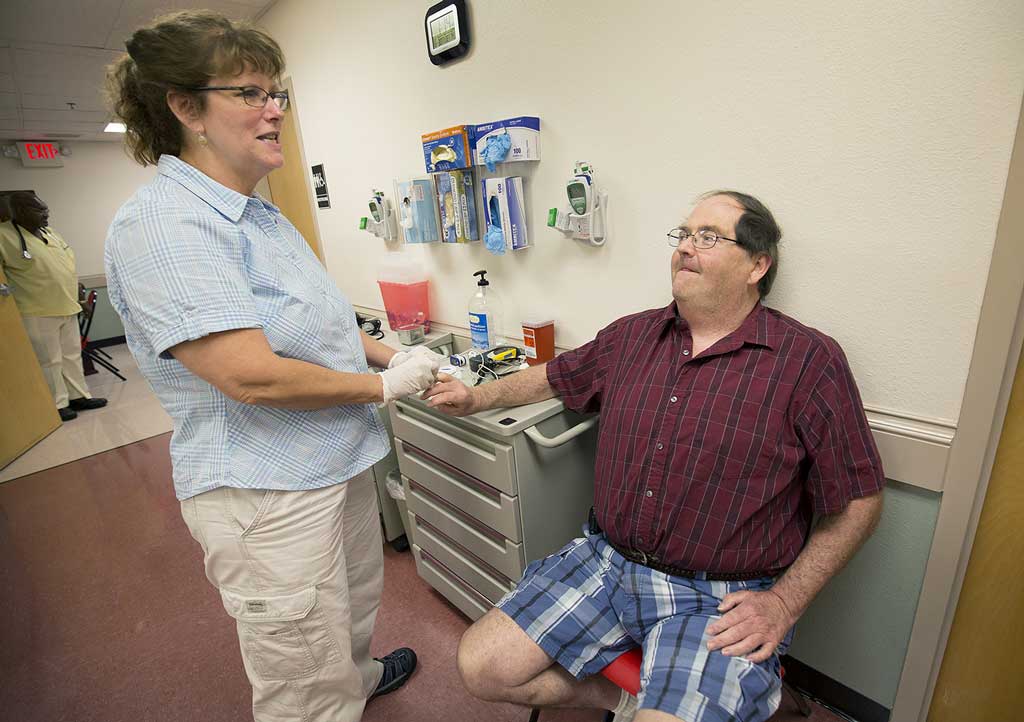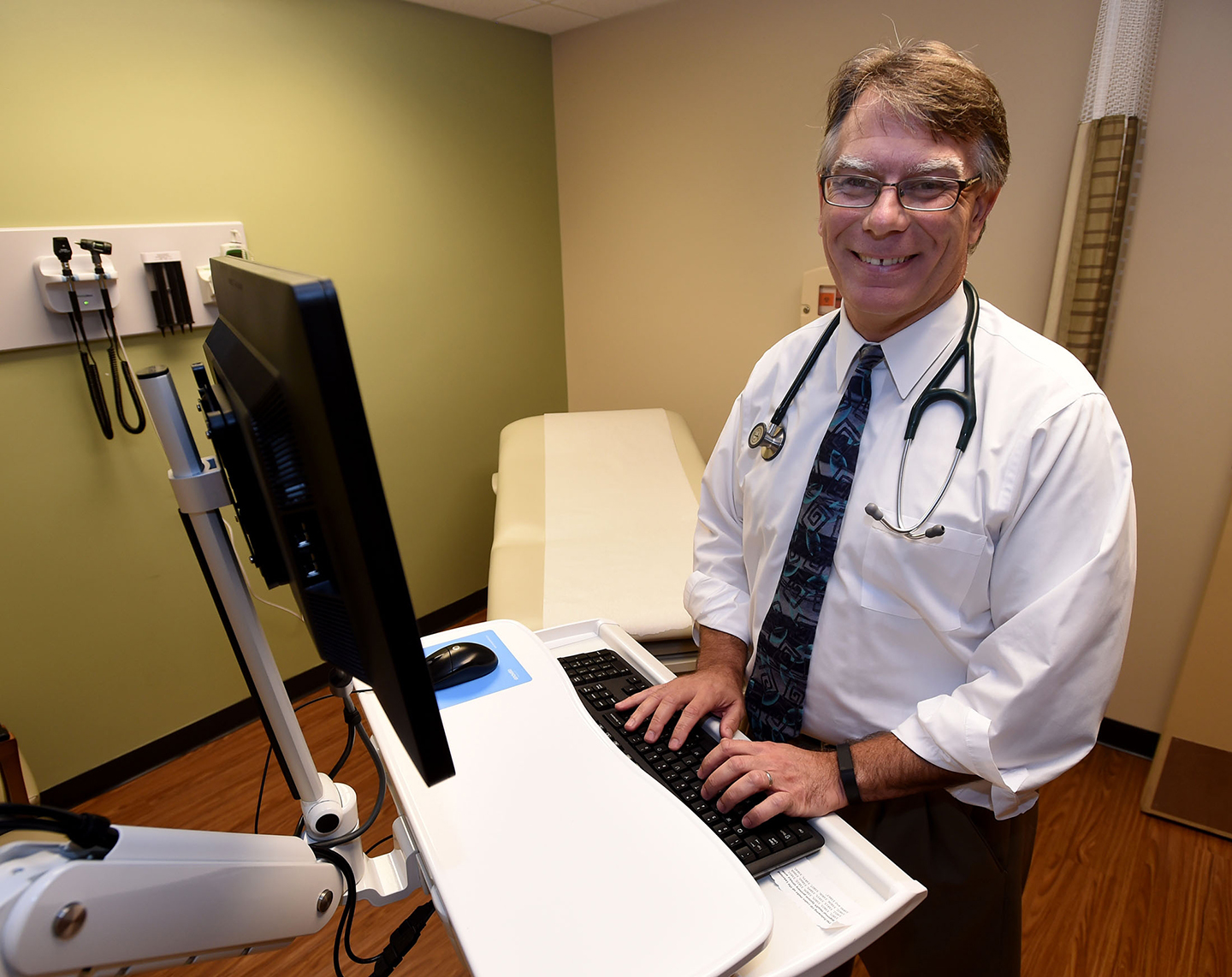
System of volunteer clinics best option for some
By ROBIN WILLIAMS ADAMS / THE LEDGER
LAKELAND – Access to doctors and medicine is something James Goad took for granted until a heart attack cost him his job as a long-distance truck driver.
Along with losing his job, he lost his medical insurance, becoming one of about 120,000 uninsured Polk County residents, many of whom struggle to find health care and afford medicines they need to control illnesses.
Being without insurance often translates into going without regular doctor visits, leaving people vulnerable to complications that send them to emergency departments.
Insurance, access to medical care, housing, food — they all matter to those who fall below the federal poverty level, or slightly above it. The Ledger is examining such issues in its five-part series “Poverty’s Widening Grasp.”
For some, relying on an emergency department becomes the only type of health care they know.
“A lot of patients just can’t afford anything,” said Joe Cole, board chairman of The Haley Center, a free volunteer clinic in Winter Haven.
Loss of medical care is another of the insidious aspects of poverty The Ledger is exploring in its five-part series.
”I’ve always been a hard worker,” Goad said. “I totally had the rug jerked out from under me.”
Many among the uninsured work part-time jobs without benefits or had worked until job loss, illness or other crises intervened, according to those who run free clinics for the uninsured. Those clinics rely on donations, volunteers and Polk’s half-cent indigent-care sales tax.
Extra: Coverage fluctuates as jobs change
“We have a lot of people, if they didn’t get their medicines here, wouldn’t get them,” said Judy Snow, director of the Good Samaritan Clinic at Talbot House Ministries.
Initially begun for the homeless, Good Samaritan also treats people in the community who struggle to retain their homes, often at the expense of medical treatment.
Goad, 54, was in that situation when he finally found Good Samaritan.
By then, the Lakeland man, who said he’s had diabetes more than 25 years, was skimping on vital supplies.
A box of 50 testing strips cost more than $100, money he no longer had. He tests his blood glucose four times a day, so one box lasted less than a month.
In addition to insulin and diabetic supplies, he needed medication for his cholesterol and blood pressure.
But he had run out of money to see doctors or pay rent.
He and his late wife would have been homeless, he said, if his landlord at Golden Wings Mobile Home Park hadn’t let them go for months without paying until Goad got approved for some income assistance.
“I had lost my job and lost my medical benefits,” he said. “The system is not set up for males with no children.”
Rent, food and utilities often trump routine health care, creating a system in which people become accustomed to thinking of health care as something done in episodes of need, said Dr. Dave Croteau, a family practice doctor at the Family Health Center run by Lakeland Regional Health.

LRH set up the center — using partial funds from the half-cent indigent care tax — to offer a medical home to some people who arrive at its hospital emergency department, uninsured, for care that often could be done in a doctor’s office.
“The vast majority of our patients are folks like you and me who are employed with benefits, then one day the job is gone,” said Matt Wheeler, the Family Health Center’s practice manager.
Many hold part-time jobs, sometimes more than one, that lack benefits, Snow said.
Some are temporarily in a financial dilemma and, as Goad was, are stunned to discover their ineligibility for programs like Medicaid.
Polk residents who earned too little to qualify for assistance under the Affordable Care Act often learned they couldn’t qualify for Medicaid either because the state hadn’t expanded its eligibility rules.
Some do qualify for the sales-tax-funded Polk HealthCare Plan, for which all five Polk hospitals and some Polk doctors take discounted rates.
But the plan’s income cap is 100 percent of the poverty level, so others rely on the free clinics, whose income cutoff is 200 percent of the poverty level.
In addition to Good Samaritan and The Haley Center, other free clinics are Angels Care of Eloise, Lake Wales Free Clinic, Lakeland Volunteers in Medicine and Parkview Medical in Haines City. (See box for locations and phone numbers.)
Their clients are considered medically indigent or medically poor, defined as having insufficient income, resources and assets to provide needed medical care without using resources required for shelter, food, clothing and personal expenses, said Joy Johnson, director of the county’s Indigent Care Plan.
It also can be defined as not being eligible for any other state or federal health program, or having medical needs that are not covered by any such program, she said.
Extra: Without free clinic man would be in hospital
In the first quarter of 2014-2015, 26,416 people were served through the Indigent Health Care Fund from the half-cent sales tax.
Of those, 5,539 were Polk HealthCare Plan members. They still are classified as uninsured because the plan covers services but isn’t an insurance product.
Another 20,877 were served by other “community partners,” which includes the free clinics and LRH’s family center. The Florida Department of Health in Polk also gets some sales tax dollars for specific programs, as does Central Florida Health Care.
Although not free, Central Florida clinics provide reduced-cost services on an income-based sliding scale.
In that first quarter, the Indigent Health Care Fund, via the half-cent sales tax, provided 141,157 services, Johnson said. The tax, approved by voters in 2004, will expire in 2019 unless re-approved in another election.
Not all uninsured are unemployed
Two men interviewed this spring at The Haley Center further illustrate needs the clinics, Polk HealthCare Plan and other programs work to alleviate.
Bob E. Abshier, 60, said he’s been a power lineman since getting out of high school.
He lived in Winter Haven pretty steadily from 1987 on, he said, although he did work in Texas for awhile.
The jobs he took gave him enough money for insurance or to cover his care, he said, until he landed up in a county jail for almost eight months, coming out without the money he needed for his blood pressure medicine.
Although he could get his blood pressure medicine, Lisinopril, for free at Publix, he needed a prescription. That was the stumbling block.
“I went to one of those walk-in clinics and it was $95 just to write me a prescription,” he said. In a jam, he went to The Haley Center for free medical care that included the all-important prescription.
“I’ve been coming here since April,” he said in late spring. “This is probably the last time since I’m going back to work.”
Like Goad and Abshier, Clinton Jefferson Blackwood has had insurance before. He worked for a landscaping company in another state, said Blackwood, 55, but came to Florida with his wife — after their children were grown — for warmer weather.
“I do a little landscaping right now, working for myself, so I have no insurance,” he said. “I just go by word of mouth.”
Not having insurance, he put off looking for health care until stomach pain became more than he could bear.
“I was getting up every day and my stomach was hurting, killing me,” he said.
Fortunately, the pain turned out to be an ulcer rather than cancer.
He said his wife, Gloria, heard about The Haley Center.
“She was telling me about this place for a (long) time, too, but with my hard head (I didn’t come)…I should have been here from the first.”
His income is sporadic, depending on demand for his services and how he feels. His wife gets about $500 a month in disability. Rent on their two-bedroom house is $530 and the light bill, well, “when that comes it cleans you out.”
Those bills, for them, took precedence over health care.
Grateful to have found The Haley Center, he doesn’t expect their finances to improve anytime soon or to qualify for affordable insurance.
“You have to live with the system until maybe it will be better one day,” said Blackwood, originally from Jamaica. “We don’t know. Only God does.”
For Goad, Good Shepherd has been a Godsend.
“Judy Snow took one look at me and sat down and spoke,” he said. “She really cares about people who become this way, but she’s no nonsense .”
The clinic supplied Goad’s medicine. A volunteer podiatrist who comes monthly to Good Samaritan treated an ulcerated sore on his foot, a complication of diabetes.
The clinic got him diabetic inserts and shoes at no cost to him. He was scheduled to get dentures in early July.
Once the next Affordable Care Act open enrollment period comes open, Goad said, he will apply for private insurance with the hope of having some of the cost subsidized. Meanwhile, lacking medical insurance and not qualifying for Medicare, he continues getting his insulin through Good Samaritan.
“I was raised (that) you didn’t take handouts,” he said, but, with his circumstances as bad as they were, he did what he had to do by asking agencies for help. He said he’s “a little bitter” about discovering so many he didn’t qualify for.
With his blood-sugar level starting to go down, Goad has regained some of his optimism. It helps that he is getting $1,800 a month in supplemental Social Security income, and has become engaged. He and his fiancee live together with a wedding planned next year.
“I wouldn’t be here today if not for Talbot House,” Goad said. “I’m going to hate to see them go when I get insurance because (the clinic) is for people without insurance.”
Of which Polk has 120,108, Johnson said, slightly more than half of whose incomes are between zero-to-200 percent of the federal poverty level.
Demand never stops.
Extra: Resources – Where to look for medical care
Lakeland Regional’s clinic, which takes some Polk HealthCare patients, had eight people visit its first day in July 2012. Now it averages about 75 a day, attracting 28,500 visits last year.
It takes time for that clinic and others to instill a sense of continuity in people used to episodic care. The clinics’ goals include getting people used to routine, preventive care.
“If it’s always been a one-stop (emergency) fix, you feel like you have no control over your health,” Croteau said.